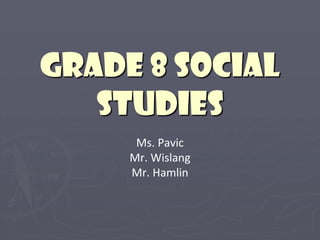
Open House - Social Studies 8
- 1. Grade 8 Social Studies Ms. Pavic Mr. Wislang Mr. Hamlin
- 2. Craig Wislang Born and educated in New Zealand 10 years teaching experience Taught in NZ, Germany, and Philippines. Always taught in the Middle School Fifth year at ISM Also teach Physical Education
- 3. From the Program Guide… SOCIAL STUDIES The Middle School Social Studies program integrates studies in the social sciences - history, cultural studies, geography, current events, sociology, and anthropology. The course is based in the intended learnings of ISM that include subject-specific Standards and Indicators and Transdisciplinary Skills. In Social Studies classes, students are encouraged to go beyond the surface of problems, to ask questions, to reflect, to make connections, to develop and test theories, to experiment with new ideas, to analyze problems, to debate hot topics, and to create meaningful and useful products…
- 6. Essential Questions These open-ended provocative questions are designed to guide student inquiry and focus instruction for “uncovering” the important ideas of the understandings. Ex: How can there be multiple versions of a truth?
- 7. Assessments Performance Assessments Performance Task with a Rubric Other Assessments Tests, quizzes, projects, essays Levels of Proficiency Exemplary (E) 100% Proficient (P) 88% Developing (D) 76% Emerging (EM) 64%
- 8. Grades Grades are calculated according to TOTAL POINTS earned Homework for completion only will earn between 1 and 5 points Tests, quizzes and other medium sized assessments in which a student must demonstrate understanding will earn approximately 20 to 30 points Performance Tasks will earn approximately 50 to 60 points To calculate: divide number of points earned by the number of possible points Grades are calculated at the semester
- 9. Grading Categories Assignments are categorized in PowerSchool according to the skills assessed Categories include our Social Studies Intended Learnings in addition to the ISM Transdisciplinary Skills Grades for project type assessments will usually be broken down into parts to communicate areas of strength and areas for growth
- 10. Learning Experiences Learning experiences are planned “with the end in mind”…to give students the practice they need to demonstrate the intended learnings in a unit of study. They may include: Simulations Reflections Oral presentations Class discussions Note taking and research strategies Individual projects Group Projects Role Play
- 11. Supporting Your Child Check PowerSchool once every two weeks Speak to your son or daughter first, and then email teachers with questions Arrange conferences through MS Office Discuss Current Events at home Offer encouragement and constructive feedback when your child shows his/her work by asking what he/she thinks was done well or could be improved Go through the planner with your child on a regular basis Encourage tutorial attendance Tuesdays and Thursdays
- 12. Thank you! Please contact me with questions or concerns as they arise so that we can work together to support your child. wislangc@ismanila.org http://wislangc.ism-online.org/